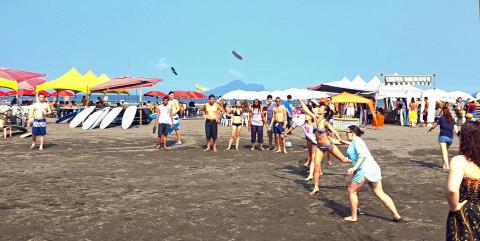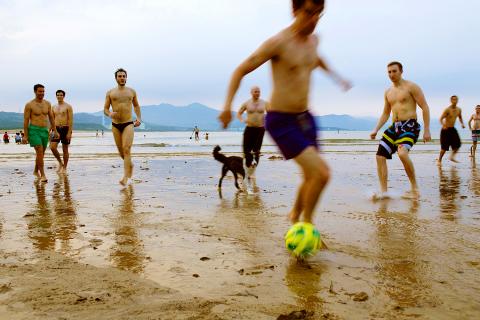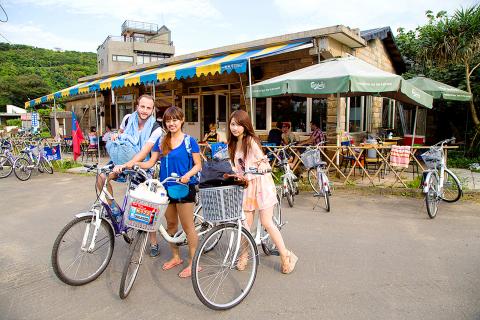When Chris Carnahan founded Taipei Trends in 2011, he envisioned the blog to be a space to tell the world everything about Taiwan — its food, its culture and its people. Since then, he has assembled a small team of dedicated writers and editors, and in addition to doing round-ups of eateries and entertainment spots, they’ve been organizing regular meet-ups where they take groups of people out to explore Taiwan through bike rides, snorkeling, cliff jumping, paragliding and bungee jumping.
If that’s not enough, they’ve also gone laser tagging, ate to their hearts’ content at potlucks, ventured inside 200-year-old homes in Tainan and played with monkeys in Kaohsiung. According to Carnahan, turn up at these events, like readership of their Web site, is largely half Taiwanese and half expat.
On Saturday, Taipei Trends will be hosting Fulong Full On, an all-day party at Fulong Beach, with activities such as water balloon tosses, relay races and sand sculpture competitions. The event will be the third large-scale beach party Taipei Trends has organized, the first being in Waiao and the one last year being a two-day camp in Fulong where they rented cabins at a campground. For this year’s Fulong Full On, they decided to scale back a bit, although there will still be the essentials: food, drinks, live music and DJs.

Photo courtesy of Taipei Trends
CULTIVATING COMMUNITY
Like many expats, Carnahan — who initially came here on an exchange program and decided to stay on — was drawn to the allure of Taiwan being under-explored and relatively unknown to the rest of the world. Great hiking trails and surf spots are everywhere, and yet not many people, even locals, know of their existence.
One thing that’s growing, Carnahan has noticed, is the number of niche groups who are organizing events for people to get together to explore the outdoors or enjoy artsy happenings in the city.

Photo courtesy of Taipei Trends
This is something he missed while working a brief stint in Shanghai, a city which he says, “has tons of connected people that know what’s happening around town, but where there is actually nothing really substantial going on, especially in art and recreation.”
Unlike some long-time residents, Carnahan doesn’t believe that Taiwan should remain a secret. Taipei is a great city on par with Hong Kong and Tokyo, he says, while Taiwan also has much to offer artists and adventurers.
“It should be cultivated by similarly adventurous people who want to preserve the culture and strong identity of Taiwan, before it’s quietly overrun by money-hungry real-estate companies and [Chinese] tourists,” Carnahan says.

Photo courtesy of Taipei Trends
TURNING OF THE TIDE?
But maybe the tide is turning. Outdoor activities, especially beach activities, are slowly becoming more acceptable.
“Fulong has a great community of people who encourage their kids to go out and play in the water and learn how to surf,” Carnahan says.
Over the years, he’s seen an increase in free divers, scuba divers and surfers, all of whom he hopes the Taipei Trends community will become more acquainted with.
The idea, Carnahan says, is to “work with them to spread the idea of beach culture, before all the beaches are taken over by commercial interests.”
He adds that some events in the past have done a bad job at promoting beach life — people go to these parties and litter, cause problems and never end up going in the water. Beach culture, Carnahan says, is not defined by spring break or music festivals, but it’s about hanging out at the beach, surfing and of course, playing in the water.
“If they wanted to go to a club, they could have just stayed in Taipei.”
This is why Carnahan didn’t want to emphasize too heavily on the “party” aspect when getting the word out about Fulong Full On. Rather, he says, it should also be mingling, taking a dip in the ocean and simply having a good time. Taipei Trends has also informed the local police and tourism bureau of the event and together with a team of volunteers, they will be combing the beach for garbage the next morning.
On that note, if you’re looking for some fun in the sun, head out to Fulong Beach on Saturday morning. If you’re looking to rave, then perhaps you’re better off taking refuge at one of the many night clubs playing similar EDM beats in Taipei.

Growing up in a rural, religious community in western Canada, Kyle McCarthy loved hockey, but once he came out at 19, he quit, convinced being openly gay and an active player was untenable. So the 32-year-old says he is “very surprised” by the runaway success of Heated Rivalry, a Canadian-made series about the romance between two closeted gay players in a sport that has historically made gay men feel unwelcome. Ben Baby, the 43-year-old commissioner of the Toronto Gay Hockey Association (TGHA), calls the success of the show — which has catapulted its young lead actors to stardom -- “shocking,” and says

The 2018 nine-in-one local elections were a wild ride that no one saw coming. Entering that year, the Chinese Nationalist Party (KMT) was demoralized and in disarray — and fearing an existential crisis. By the end of the year, the party was riding high and swept most of the country in a landslide, including toppling the Democratic Progressive Party (DPP) in their Kaohsiung stronghold. Could something like that happen again on the DPP side in this year’s nine-in-one elections? The short answer is not exactly; the conditions were very specific. However, it does illustrate how swiftly every assumption early in an

Inside an ordinary-looking townhouse on a narrow road in central Kaohsiung, Tsai A-li (蔡阿李) raised her three children alone for 15 years. As far as the children knew, their father was away working in the US. They were kept in the dark for as long as possible by their mother, for the truth was perhaps too sad and unjust for their young minds to bear. The family home of White Terror victim Ko Chi-hua (柯旗化) is now open to the public. Admission is free and it is just a short walk from the Kaohsiung train station. Walk two blocks south along Jhongshan

Francis William White, an Englishman who late in the 1860s served as Commissioner of the Imperial Customs Service in Tainan, published the tale of a jaunt he took one winter in 1868: A visit to the interior of south Formosa (1870). White’s journey took him into the mountains, where he mused on the difficult terrain and the ease with which his little group could be ambushed in the crags and dense vegetation. At one point he stays at the house of a local near a stream on the border of indigenous territory: “Their matchlocks, which were kept in excellent order,